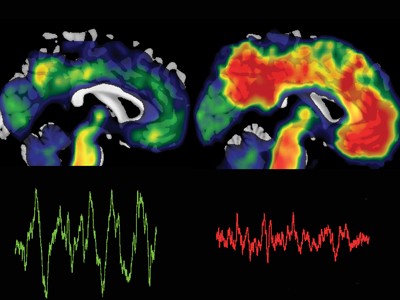Your brain is older today than it was yesterday.
But aging doesn’t need to be accompanied by deteriorating brain function, such as dementia or memory loss. This is something you can avoid or postpone.
How? By doing everything you can to get a good night’s sleep.
Research just released shows that a lack of restorative slow-wave sleep can lead to an accumulation of beta-amyloid in the brain. Beta-amyloid is the protein suspected to be the cause of Alzheimer’s disease and other dementias characterized by the gradual death of brain cells.
Alzheimer’s is one of the world’s fastest growing public health concerns. How can we explain this? I have no doubt it is related to our culturally accepted lack of sleep, and disregard for the hours of darkness that our body requires.
Here is an example of how sleep impacts our brain health:

The brain scan on the right shows the red coloured deposits of beta-amyloid and disturbed slow-wave sleep. Compare that to the person on the left who shows high-amplitude slow-wave sleep and little sign of beta-amyloid build up.
Our time in slow-wave sleep is when our brain cells actually shrink to allow more cerebrospinal fluid (CSF) to expand into the brain to clean and repair tissue. This clean-up time is when our CSF washes away toxic metabolites such as beta-amyloid.
The researchers state that,
“Sleep is helping wash away toxic proteins at night, preventing them from building up and
from potentially destroying brain cells.
It’s providing a power cleanse for the brain.”
Poor Sleep = Memory Loss
Poor sleep also affects our brain’s ability to thrive and form dendrites that branch out into new pathways connecting related information. The formation of these pathways is how memories form and learning occurs.
To improve memory and offset aging of the brain, do everything you can to sleep well tonight (like checking out the tips in my free guide to help Overcome Insomnia).
Also, read this post for more details about how sleep, learning and memory are interrelated.
Sleep well tonight!









